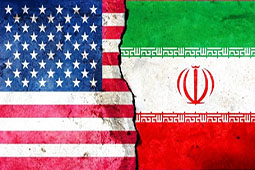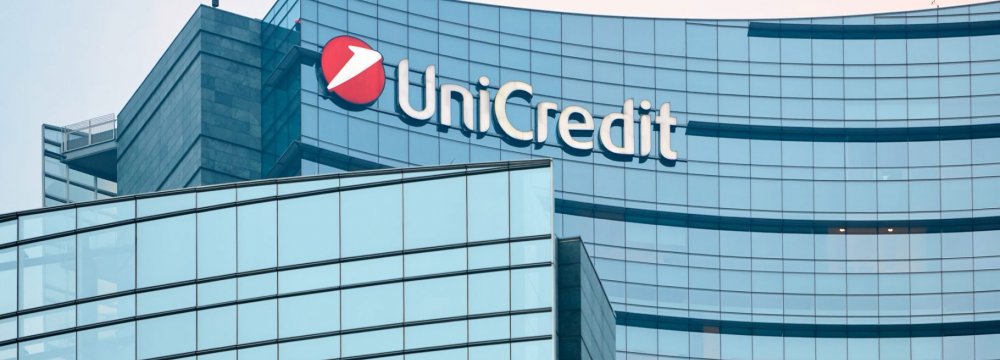
UniCredit Near $900m Deal With US Over Iran Sanctions


The deal would cost the Italian lender about $900 million but spare it from criminal prosecution, the people said.
A settlement of that size would be one of the largest for violations of US sanctions laws, exceeded only by agreements reached with Societe Generale SA, Commerzbank AG, HSBC Holdings Plc and BNP Paribas SA, Bloomberg reported.
Among them, only BNP Paribas admitted guilt. The others entered into deferred-prosecution agreements.
“This is very positive for UniCredit because it eliminates one of the remaining pending risks for the bank,” said Fidentiis Equities analyst Fabrizio Bernardi. “This can improve UniCredit’s valuation for the future.
Chief Executive Officer Jean Pierre Mustier inherited the case from previous management when he took the helm in July 2016. He announced provisions related to the probe in November and said he didn’t expect it to have a material impact on the bank’s accounts.
A deal is expected in the coming weeks, the people said. It would resolve investigations of UniCredit by the US Justice Department, the US Treasury Department’s Office of Foreign Assets Control, the federal reserve, the Manhattan district attorney’s office and New York’s department of financial services.
Representatives from those offices declined to comment or didn’t immediately respond to messages. A UniCredit spokesman declined to comment.
Italy’s biggest bank, UniCredit is one of several European financial institutions settling cases for alleged sanctions-busting. Fifteen European banks have paid more than $18.5 billion over the last 15 years for violating US sanctions on certain countries, particularly Iran. BNP Paribas’ $8.97 billion penalty in 2014 was by far the largest.
Standard Chartered Plc may also be getting close to settling allegations that it violated Iran sanctions. On Monday, it agreed to a short extension of its non-prosecution agreement with supervising authorities to “allow for additional time to resolve the outstanding investigation into our historical US sanctions compliance.”
The UniCredit settlement would be the second by an Italian bank. Intesa Sanpaolo SpA, the country’s second-biggest bank, agreed to pay $235 million in December 2016 to resolve a New York regulator’s allegations that it flouted money-laundering controls for a decade.
A US judge also dismissed a lawsuit seeking to hold nine large European banks liable for allegedly providing banking services to Iran that enabled militants to conduct 55 attacks against US armed forces in neighboring Iraq.
In a decision, US District Judge Laura Taylor Swain in Manhattan said the banks’ alleged misconduct was too far removed from the attacks, which occurred from 2003 to 2011, to support civil liability under federal anti-terrorism laws.
Barclays Plc, BNP Paribas SA, Commerzbank AG, Credit Agricole SA, Credit Suisse Group AG, Deutsche Bank AG, HSBC Holdings Plc, Royal Bank of Scotland Group Plc and Standard Chartered Plc had been sued by military personnel who survived the attacks, and relatives and estates of those killed.
The plaintiffs accused the banks in a 533-page complaint of concealing their work for Iran through such practices as altering wire transfers, and masking the identities of those transferring funds.
“The complaint does not allege plausibly that the provision of banking services, which are not inherently violent or dangerous, can be considered as acts dangerous to human life,” Swain wrote.
Setback for 9/11 Plaintiffs
A Luxembourg court refused late last month to enforce a US ruling that would have helped families of victims of the Sept. 11, 2001 attacks claim Iranian assets held with a Luxembourg-based clearing house.
The court ruled that there were no grounds in international law to uphold in Luxembourg a US court decision in 2012 to strip Iran of sovereign immunity.
Seven years ago, a New York court found there was evidence to show that Iran provided “material support and resources to al Qaeda for acts of terrorism”. The militant group carried out the hijacked plane attacks on New York and Washington.
That court awarded the plaintiffs damages of over $7 billion. Iran denies any links to Al Qaeda or any involvement in the Sept. 11 attacks, Reuters reported.
However, the Luxembourg court said the plaintiffs could not continue their legal case to seize Iranian assets in the country.
“The rule on which the US court had relied to remove jurisdictional immunity is not in accordance with public international law and cannot be applied in the context of the Luxembourg case,” the court said in a statement.
Families of victims are seeking access to $1.6 billion of Iranian funds in Luxembourg, which were frozen as part of international sanctions over Iran’s nuclear program.
They were not made available to Tehran, even after sanctions were lifted in 2016. The Luxembourg court has yet to rule whether the money, held with Luxembourg-based clearing house Clearstream, can be returned to Iran.
Reacting to Luxembourg court decision, Iran’s Foreign Ministry spokesman Bahram Qasemi said the decision showed the world still had courts that adopt independent decisions.
“The era of totalitarian and bullying behavior of America toward other countries is over and it can no longer raise such groundless accusations,” Qasemi was quoted as saying by IRNA.
Governor of the Central Bank of Iran, Abdolnasser Hemmati, called the decision “an important legal victory for Iran”.
The president’s deputy for legal affairs Laya Joneidi was quoted by IRNA as saying that the lawyers won the case by arguing that Sept. 11 attacks were not related to Iran.


Trump weighs using $2 billion in CHIPS Act funding for critical minerals

Codelco cuts 2025 copper forecast after El Teniente mine collapse

Electra converts debt, launches $30M raise to jumpstart stalled cobalt refinery

Barrick’s Reko Diq in line for $410M ADB backing

Abcourt readies Sleeping Giant mill to pour first gold since 2014

Nevada army depot to serve as base for first US strategic minerals stockpile

SQM boosts lithium supply plans as prices flick higher

Viridis unveils 200Mt initial reserve for Brazil rare earth project

Tailings could meet much of US critical mineral demand – study

Kyrgyzstan kicks off underground gold mining at Kumtor

Kyrgyzstan kicks off underground gold mining at Kumtor

KoBold Metals granted lithium exploration rights in Congo

Freeport Indonesia to wrap up Gresik plant repairs by early September

Energy Fuels soars on Vulcan Elements partnership

Northern Dynasty sticks to proposal in battle to lift Pebble mine veto

Giustra-backed mining firm teams up with informal miners in Colombia

Critical Metals signs agreement to supply rare earth to US government-funded facility

China extends rare earth controls to imported material

Galan Lithium proceeds with $13M financing for Argentina project

Kyrgyzstan kicks off underground gold mining at Kumtor

Freeport Indonesia to wrap up Gresik plant repairs by early September

Energy Fuels soars on Vulcan Elements partnership

Northern Dynasty sticks to proposal in battle to lift Pebble mine veto

Giustra-backed mining firm teams up with informal miners in Colombia

Critical Metals signs agreement to supply rare earth to US government-funded facility

China extends rare earth controls to imported material

Galan Lithium proceeds with $13M financing for Argentina project

Silver price touches $39 as market weighs rate cut outlook

















